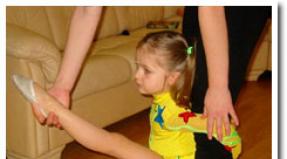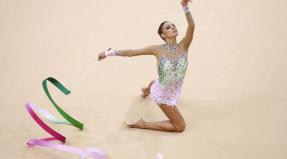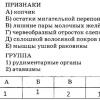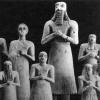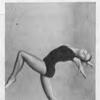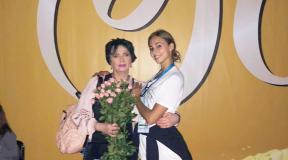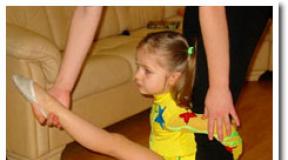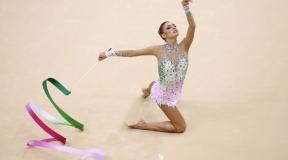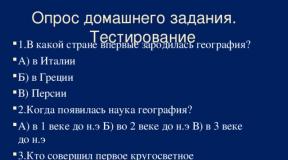Evgenia Kanaeva: biography, height and weight, personal life of a gymnast. Kanaeva Evgenia Olegovna rhythmic gymnastics Rhythmic gymnastics Evgenia
Russian gymnastics is rightfully proud of a whole galaxy of beautiful artists who compete with honor for the title of the strongest at major championships and become Olympic medalists. One of them is Evgenia Kanaeva.
First steps
It all started back in 1996, when a six-year-old girl, Zhenya, was brought by her grandmother to coach Elena Arais. Arais, who was starting her coaching career at that time, invested all her knowledge, skill and passion for rhythmic gymnastics into the girl.
Fortunately, the seeds fell into fertile soil: Zhenya’s mother is a master of sports in rhythmic gymnastics. From her mother and grandmother, the girl inherited a love of gymnastics, sports stubbornness and the ability to achieve her goals at the cost of many hours of training. And the grandmother became a faithful companion for her beloved granddaughter at the beginning of her sports career - she accompanied her everywhere to training and competitions.
Older athletes could also envy little Zhenya’s tenacity: Arais admired the amazing desire of a very little girl to complicate her training and include new elements in her program.
First victories
At the age of twelve, Evgenia, as a member of the Omsk juniors, participated in a sports training camp in Moscow, where she attracted the attention of coach Amina Zaripova. Since then, Zhenya has continued training in the capital. During this period, her coach Vera Shtelmbaus, Elena Arais’ mother, had a great influence on her. Shtelmbaus at that time was the personal trainer of another famous gymnast from Omsk, Irina Chashchina, and did not ignore her daughter’s pupil.
The young gymnast’s sporting success and perseverance attracted the attention of the national team’s head coach, Irina Viner. Irina Aleksandrovna was able to discern enormous potential in the girl and decided that it would be useful for her to train among famous athletes. Kanaeva was asked to continue training at the Novogorsk training center, where the training base for members of the Russian national team was located. The girl was lucky - Vera Shtelmbaus also worked there, so the decision to transfer to the center was made by mutual consent. Evgenia’s love for rhythmic gymnastics, her athletic perseverance and talent never made the coaches doubt the correctness of their choice.
Path to Olympus
Despite the natural talent and the enormous tenacity with which Zhenya trained, her ascent to the sports podium cannot be called easy. All places in the team were occupied until 2007, when, due to a serious injury, Alina Kabaeva withdrew from the team preparing for the European Championship in the capital of Azerbaijan, Baku.
All this time, Evgenia Kanaeva trained persistently and hard, mastering more and more complex elements and honing her skills. Therefore, to replace the venerable Kabaeva, who dropped out of the national team, Wiener took her. True, so far the coach has risked entrusting Evgenia with only the performance with the ribbon. However, even then the young athlete was able to achieve the attention and recognition of fans and judges by winning gold.
And just a few months later, Zhenya achieved another gold - in the team competition at the World Championships in Patras, Greece. Since then, Evgenia has declared herself as a strong athlete who is ready to compete for Olympic medals.

Olympic takeoff
2008 started well for Kanaeva. Already in the spring of the same year, at the Russian Championship, she confidently became the absolute champion of the country. This season, Zhenya managed to take the main prize at all stages of the Grand Prix and World Cup, where the artist took part, and later at the European Championship. Even then, the media started talking about the gymnast as the main contender for gold at the upcoming Olympics.
And the predictions came true! In Beijing, Evgenia Kanaeva showed the best result of 75.5 points. She beat her closest rival, Belarusian athlete Inna Zhukova, by 3.5 points. The gymnast spectacularly repeated her success in London.

After retiring from big-time sports, Zhenya Kanaeva did not part with her favorite job: today she is a young coach of the Russian youth team. Evgenia instills a love of rhythmic gymnastics and sports skills in teenagers aged 12–14, considering it not a job, but a gift of fate.
Evgenia Kanaeva was born on April 2, 1990 in Omsk. She won the Olympics twice - in 2008 and 2012. For the first time in history, she became a two-time Olympic champion in the all-around. He holds the title of Honored Master of Sports of Russia.
Start
Evgenia was lucky with her parents: her mother is a master of sports in rhythmic gymnastics. Sports genes and the example of her mother largely determined the future success of the champion. Kanaeva came to sports at the age of 6. Despite such a young age, she immediately began to show great potential. The coaches were amazed and delighted by the young gymnast’s desire to learn new complex elements. All the children had already gone home, and Zhenya was still training.
At the age of 12, Evgenia Kanaeva, as part of gymnasts from Omsk, was invited to a training camp in Moscow. There she was noticed by Amina Zaripova, a junior training coach.
In 2003, Zhenya competed in the Gazprom team at the World Club Championship in the junior category. She became the winner of these competitions. Around the same time, the head coach of Russian artistic gymnasts, Irina Viner, drew attention to her. Kanaeva was invited to train at the Novogorsk center, the base of the Russian national team members. This completely changed the athlete’s life. Now she has real chances to achieve the greatest heights in gymnastics.
Way up
There are a lot of talented gymnasts in Russia, high competition, so it is very difficult for any athlete to get to the top. Evgenia Kanaeva was no exception. Her competition included such giants as Vera Sesina and Olga Kapranova. There was no place on the team for Zhenya.
Evgenia Kanaeva speaking
In 2007, luck finally smiled on the athlete. Alina Kabaeva was seriously injured, and Irina Viner chose Evgenia as a replacement. Kanaeva’s visit to the carpet was, one might say, fleeting. The head coach trusted her only with exercises with the tape. And Zhenya did not let down either the coaches or the sports fans. She won the ribbon final and the team competition.
A few months later, she took gold in the team competition at the world championship in the Greek city of Patras.
Olympics
Evgenia won her first Olympic gold at the 2008 Olympics in Beijing. Zhenya had a number of difficulties, but in the end she overcame everything and became the champion by a wide margin. All four programs (ribbon, jump rope, clubs and hoop) by Kanaeva at the Beijing Olympics were highly complex, were well thought out in terms of musical accompaniment and revealed the athlete’s individuality. The tape was composed to the original “Moscow Evenings”, performed on the piano.
Zhenya began the 2008 Olympic season in the shadow of Kapranova, Sesina and the current world champion, Ukrainian Anna Bessonova. But in mid-spring all obstacles were behind us. Kanaeva won all stages of the Grand Prix and World Cups and became the absolute champion of Russia.
At the European Championships in Turin, Italy, she was already a full-fledged member of the Russian team. Then she left Kapranova and Bessonova behind and became the European champion with high marks.
Head coach Irina Viner by that time already considered Evgenia the main contender for a place in the Olympic team. As a result, Wiener decided that Russia would be represented at the 2008 Olympics by Kanaeva and Kapranova. Zhenya became the youngest Olympic finalist in rhythmic gymnastics. However, she was the most collected and made the fewest mistakes.
According to Evgenia Kanaeva, the Olympics are not like other competitions, here you need to fully concentrate on yourself, the apparatus and the mat, you cannot be distracted by anything. She convinced herself that everything would be fine, that there was nothing to worry about. That’s what happened in the end - Zhenya won the Olympics, scoring an excellent 75.50 points. She was ahead of Inna Zhukova from Belarus by 3.50 points.
Irina Viner then said that it would not be very easy to repeat Kanaeva’s result in the near future.
At the 2012 Olympic Games in London, Zhenya became the champion for the second time. She was unattainable for her rivals with a score of 116.9 points in exercises with a ball, hoop, ribbon and clubs.

Evgenia Kanaeva and gold at the 2012 Olympic Games in London
After London, Evgenia is the first ever two-time Olympic champion in the individual all-around.
Records
The only two-time Olympic champion in history in the individual all-around (London).
At the 29th World Championships she won all the gold (6 medals).
The 31st World Championship was the third won in a row. The second time she won 6 out of 6 gold medals. She became the only winner in history of 17 gold medals at world championships.
At the Grand Prix final in Brno (Czech Republic), she was the first in history to score 30 points out of a possible 30.
Personal
On June 8, 2013, she became the wife of KHL hockey player Igor Musatov. The couple dated for a year before the London Olympics. After the Olympics, Igor proposed to Evgenia.
Childhood
Zhenya’s mother is a master of sports in rhythmic gymnastics. But at the age of 6, she was introduced to sports by her grandmother, who loved figure skating and rhythmic gymnastics. Young Evgenia showed impressive abilities. Elena Arais, the daughter of the gymnast’s current coach Vera Shtelbaums, began training Kanaeva. The first coach was amazed by the student’s desire to learn new and complex elements. At the sports school, everyone noticed that Kanaev’s wife often stayed to train when everyone had already left. The grandmother waited for her granddaughter in the hallway for hours.12-year-old Kanaeva was invited to Moscow for a training camp for young Omsk gymnasts. Amina Zaripova saw her performance; this coach was responsible for training the juniors. Later, the girl was invited to train at the Olympic reserve school. Zhenya began to improve her results, thanks to the fact that Vera Shtelbaums was next to her in Moscow.
In 2003, Kanaeva competed for Gazprom in Japan at the club championship in the junior category and won. The gymnast represented Russia together with Alina Kabaeva and Irina Chashchina. At the same time, she was noticed by Irina Viner, the head coach of the Russian rhythmic gymnastics team. The girl was invited to the base of the Russian national team members, to the Novogorsk training center. As Wiener says, this was a turning point in the athlete’s life.
“Kabaeva also once began her training among the stars. And Zhenya was lucky that coach Vera Shtelbaums worked in the Novogorsk center. And we were lucky that we decided to send Kanaev there. And she showed herself to be talented and skillful, and besides, she loves gymnastics,” says Wiener.
Start of a sports career
Zhenya Kanaeva’s climb to the podium was not easy. This is due to the fact that there are a lot of talented gymnasts in Russia. After Kabaeva and Chashchina won medals at the 2004 Olympics, Olga Kapranova and Vera Sesina began to rise to the top. They then became the leaders of rhythmic gymnastics in the country. Kabaeva continued to perform, so there was no place for Kanaeva in the Russian team. But the girl continued to work and luck was on her side in 2007. Then, in the summer, the composition of the team for the European Championship was already known - it was Sesina, Kapranova and Kabaeva. But Alina was seriously injured and was unable to go. A replacement was found in Kanaeva, and the gymnast was entrusted with performing the ribbon.Evgenia appeared on the carpet for an instant, but did not let her fans and coaches down. She won gold in the final, performing with a ribbon, and won in the team competition. Well, a few months later the gymnast brought gold at the World Championships, in the team competition.
Olympic season
The four programs of the 2008 Olympics (ribbon, jump rope, hoop, clubs) were quite complex and musically thought out. The performances revealed individuality. The program with the tape was compiled for the piano version of “Moscow Evenings”. Then Kanaeva performed in the shadow of Kapranova and Sesina, as well as the current world champion Anya Bessonova. But by mid-spring the girl was able to win the overall championship at the Grand Prix and World Cup stages. Kanaeva became the absolute champion of Russia. 
And at the European Championships, the girl had already left the reserves and was part of the Russian national team. Zhenya beat Kapranova and Bessonova and won the title of European Champion. Even then, the gymnast was considered the main contender for participation in the Olympic Games. And so it happened, at the Beijing Olympics the girl represented the country together with Kapranova.
It is worth noting that Zhenya Kanaeva became the youngest among the finalists in the rhythmic gymnastics competition at the Games. By the way, she made the fewest mistakes. As a result, the athlete won the Olympics.
And in 2012, at the London Olympic Games, Evgenia Kanaeva became a two-time champion.
Record holder
In 2009, when new rules were introduced, the gymnast's style changed. At the beginning of the season, the girl was tormented by fatigue and injuries. But she continued her streak of victories in the overall championship. In several finals with individual programs, she lost to Anna Bessonova or Vera Sesina. Then, at the European Championships, which took place in Baku, Zhenya took gold in all types of the program. Then she won 9 gold medals at the Universiade and World Games. For her excellent result at the Universiade, the girl was awarded the title “Heroine of the Games.” In the fall of the same year, Kanaeva had the opportunity to win the world champion title. Zhenya qualified with the first results in the programs, she won four gold medals. She also received a medal as part of a team together with Daria Dmitrieva, Daria Kondakova and Olga Kapranova. By the start of the competition, she already had 5 gold medals in one world championship, as a result, Kanaeva repeated the record of Oksana Kostina in 1992. After the performances, the gymnast won her sixth medal, thereby breaking the record at a single championship.Evgenia Kanaeva on video
At the 2011 World Championships, Evgenia repeated her achievement and again won 6 of the 6 top awards in individual disciplines. So, as a result of the competition, Kanaeva became a 17-time world champion in her sport.
Personal life of Evgenia Kanaeva
Zhenya’s success not only brought her the love of fans, but also continued the tradition of the Omsk school of preparing excellent athletes. Sports commentator and former gymnast Laysan Utyashcheva said that Kanaeva is Kabaeva and Chashchina combined. But Zhenya doesn’t like comparisons. In her interviews, she often talks about the future, says that she lives only for today, and victories only motivate her to achieve even better results. Coaches say that the athlete lives by the principle of “it’s hit or miss,” and this is what sets her apart from other gymnasts. Victory and defeat serve as a lesson for Evgenia.Evgenia Kanaeva always listens to her coaches, but at the same time always expresses her opinion when drawing up programs. She constantly learns, not without pleasure, new elements, and also tries new styles. And the main thing in gymnastics for an athlete is not the scores at all, but the reaction of the audience. Current coaches say Kanaeva will make an excellent coach herself.
Evgenia in her small homeland
Now the girl is studying at the Siberian State University of Physical Culture and Sports. After finishing her sports career, Zhenya intends to learn to draw and play the piano. In addition, he dreams of learning English and learning how to use a computer. In 2009, Zhenya was given the title of “Honored Master of Sports of Russia.”
18 December 2017, 19:18Evgenia Kanaeva-Musatova is an outstanding Russian athlete, the most titled “artist” on the planet. Born on April 2, 1990 in Omsk.
My wife is only 27 years old, and she is a true legend of world sports with a huge number of records.
She won two consecutive Olympics (Beijing 2008 and London 2012) in the individual all-around, which has never been achieved in this sport, and is unlikely to happen in the future. In Beijing, Zhenya was the youngest finalist, and in London she became the oldest Olympic champion in the history of this sport.

She became the absolute world champion three times in a row, and in total she has 17 gold medals at the world championships. During her career, Evgenia won 59 different tournaments without losing a single (!!!) start. She came second several times, but this was in individual apparatus events; she never lost the all-around.

The official website of the Olympic Games writes about her simply: the greatest athlete in the history of rhythmic gymnastics. Dot.

At one time, no less outstanding gymnasts competed with her: Anna Bessonova (Ukraine), Inna Zhukova (Belarus), Daria Kondakova (Russia), Olga Kapranova (Russia), Daria Dmitrieva (Russia), Aliya Garayeva (Azerbaijan) and many others. But it was she who, for the 8 years that her adult career lasted, was the absolute prima of rhythmic gymnastics.
Zhenya amazed with her refined technique and was unusually musical and expressive. In one and a half minutes she created an entire mini-performance. She was not afraid to take music that was difficult to interpret on the carpet: Stravinsky, Rachmaninov, Chopin, Glinka, Shchedrin. And most importantly, she did the most difficult things with incredible ease.
The former president of the International Gymnastics Federation, Italian Bruno Grandi, once called her exercises “cosmic” and compared them with the creations of Michelangelo.
Incendiary Carmen with clubs, a crystal ballerina with a ribbon to “Moscow Evenings,” a frantic pagan from Stravinsky’s “Dances of the Goldfinch,” a Russian beauty in “Merry Quadrille.” Evgenia could master any image, she could do anything!



The secret of her success was her incredible work ethic, amazing modesty, constant desire to improve and great love and dedication to the sport. Perhaps genes also played a role: her father was a famous Omsk wrestler, Master of Sports of the USSR in classical wrestling, and her mother was a Master of Sports in rhythmic gymnastics.
My wife is also very lucky. She avoided serious injuries, excellent specialists worked with her - personal trainer Vera Efremovna Shtelbaums, and then Irina Viner herself, the outstanding choreographer Irina Zenovka, then you can list half of Novogorsk (the sports base where the Russian rhythmic gymnastics team trains), because almost everyone who works there is in one way or another involved in Zhenya’s great victories.
As a person who has been following rhythmic gymnastics for a long time, I think that simply performing at the Olympics is already a great achievement for a gymnast. The competition in Russia in this event is enormous; out of hundreds of thousands of aspiring gymnasts, only dozens will make it to the national team. Injuries can end your career at any time. It is also important to be noticed by the Russian national team coaches. And Zhenya was very lucky that everything worked out in her favor. But it seems to me that one must be prepared for such gifts of fate. And she was ready, thanks to her phenomenal hard work and dedication to the sport.
“There are no ideal gymnasts. Some are blessed with beauty, some with a gorgeous body, others with excellent technique. It’s rare to have everything at once.”

"...in general, I'm a shy person. I feel uncomfortable when I'm being filmed and even photographed. I'm very self-critical and strange. For example, I always loved to train. Even when it was hard. Maybe I'm a masochist (laughs)."

“Kanaeva is a symbol of overcoming. A girl with average abilities came into sports and made history.” Irina Viner

“I was a rather chubby child and had a club foot. I was actually sent to the gymnastics section at the age of six just so that I would lose weight and my legs would become straight and slender. No one would have thought that everything would turn out like this.”

"I dreamed of going to the Olympics [Beijing 2008], but I didn't expect it to happen. It seemed to me that everyone was much better than me. It was a shock for me."

“What is the most important thing for gymnastics? To be easy. First, this is the advantage of youth, then it is working on yourself and is synonymous with professionalism.”

“We have a cruel sport. You can’t lose a single start: if you don’t exist, there will be someone else.”

“When I started, they said so many things about me, they called me an ugly duckling. But maybe thanks to this criticism I became stronger. I didn’t finish the element, you say? Okay, I’ll make sure there’s nothing to complain about.”

“She is a very modest and reserved girl and never talks about her life, especially since she had no personal life. She had no life outside of rhythmic gymnastics. Only before the Olympics in London did she meet her love, as it has now become known. She met She loved her in the clinic where she was being treated, and he was also being treated there." Irina Viner

“If we continue the theme of appearance, then my ideal is the actress Audrey Hepburn. Plus, when I was a child, I collected stickers with Princess Diana. I was sure that she was an angel!”

“I was invited to appear on television. But I believe that to engage in this activity you need to receive a special education and be a competent person in this environment. Going on television simply because you have the name and title of Olympic champion is wrong.”

“I can sacrifice a lot for the sake of the cause. Many were surprised that I won the Olympics right away, but Vera Efremovna and I trained a lot. At half past six in the morning we were already in the hall, so as not to wait later for the carpet to be free. Then the choreography , light breakfast, rest, second training, lunch, rest, third training..."

“I have a lot of shortcomings. For example, it would be nice to improve the jump, make it higher. The stretching is far from ideal. I definitely wouldn’t be accepted into ballet with such a foot.”

“Very talented girls trained next to me. Much more capable than me. They had better data, better figures, and more expressive faces. Together, they were amazing gymnasts.”

“I have my own trick [at competitions, when the fear of making a mistake appears]. I begin to think that my mother will not love me any less.”

"Advice to young gymnasts? We live once and we should enjoy it. Don’t be constrained, don’t be afraid of mistakes. They will happen in any case. Everyone goes through this. There are no victories without losses, so you shouldn’t be afraid to make mistakes. We should probably , be afraid of something else - repeated mistakes."

"In London, I already had a goal - to go through the entire cycle and reach the end. It was very difficult. You know, everything really coincided there. And it coincides once in a million."

“Thank God that sport opens up some opportunities. You know... thanks to sport, I saw the sea for the first time when I went to Sochi for a training camp. Thanks to sport, I got an apartment.”

“Irina Aleksandrovna “strives” to find Tatar roots in every gymnast. I don’t know, it’s quite possible that I have them, but I want to say that I have a lot of blood mixed together.”

“To perform at the Olympics is a great happiness and success.”

“I promised myself never to show my fatigue on the carpet, not to show it to the audience. We are actresses on the carpet, and everything we do should look easy and simple.”

“I clearly remember that the coaches called me “goosebumps”. At one time, some of them said about me: no, Zhenya will remain small, unnoticed. And she won’t grow up. I was very worried about this. But, Thank God I grew up."

“I don’t have the most ideal parameters for doing rhythmic gymnastics and I don’t have the longest legs. I just madly love what I do, and I don’t know what rest is. In my case, if you don’t work out for a month, the ligaments become ossified.”

“I will repeat for the hundredth time that the “Kanaeva phenomenon” is hard work. And talent. Not a single medal has fallen from the sky into her hands.” Elena Arais, first coach.

“The hardest thing in our sport is nerves. Sometimes learning the most difficult element is easier than controlling yourself. And I still have to work and work on this task.”

“I am sure of one thing: if you want to be better than others, work harder than everyone else. I can’t stand still, I need to progress and show something new. This is the only way to stay at the top."

“Chashchina and Kabaeva became a huge example for me. Alina turned the world of gymnastics upside down, opened it up from a different side. She was so emotional, artistic and sincere in her performances that it was impossible to tear herself away. For this, the entire sports world loves and respects her. And Ira captivated everyone with her plasticity. And no one owned and does not own the object like she does. In general, creatures from another planet."

As a child, Zhenya made a wish and wrote in her diary that she wanted to become an Olympic champion. She doesn’t remember this; her mother, Svetlana Kanaeva, showed her the recording years later.
She became the first gymnast in the history of rhythmic gymnastics who managed to get the highest score under a 30-point judging system.
On June 8, 2013, she married hockey player Igor Musatov. Marina Gogua, the one who has been dressing her in gymnastic leotards for the last 4-5 years, sewed Zhenya’s wedding dress.


In 2013 she graduated from NSU. them. P.F. Lesgaft in St. Petersburg.

Now Evgenia Kanaeva-Musatova works as a coach and educates young gymnasts.

About the second, historic victory in London:
“I would like to use this opportunity to thank everyone who helped me, who put part of their soul into this victory and not only this, but all previous ones. I am very grateful to my mentor Vera Efremovna Shtelbaums, the head coach of the national team Irina Alexandrovna Viner, her husband Alisher Burkhanovich for the enormous support of rhythmic gymnastics, my director Irina Borisovna Zenovka, the team’s choreographers, doctors, massage therapists and everyone, everyone who contributed part of their soul to this victory. I also want to thank my first coach Elena Arais for everything. , Amin Zaripova and Natalya Kukushkina, who trained me at the Olympic training center in Moscow. Thank you very much to all of them, I would not have been able to achieve what I have achieved. his support and for his love. Being loved is a great happiness.
And thank you, the fans, very much. Special thanks to Zoya, as we call her, who flew to London from Taiwan to support me and cheer for our Russian team. I have always felt the support of loved ones and even those I don’t know... But this year it was especially strong. This was our common victory."

Evgenia Kanaeva’s sports career began at the age of six, when, at the insistence of her grandmother, the girl was shown to rhythmic gymnastics coach Elena Arais. Despite her small age, the girl won the hearts of Omsk coaches with her amazing hard work and unusually high potential. Years later, memories of Zhenya’s irrepressible energy, who continued grueling training beyond the time allotted in the sports section, remained in the memory of the people who participated in the development of the young athlete.
The desire to achieve her goals, strong character and support from loved ones led the eighteen-year-old girl to the top step of the sports Olympus.
The formation of the career of Evgenia Kanaeva
For Evgenia, the first significant result of her work in rhythmic gymnastics was an invitation at the age of twelve to a team training camp in Moscow, which radically changed the life of the Omsk gymnast. The young athlete impressed Amina Zaripova, the coach of the youth team, with her talent, who invited Evgenia to continue her studies at the Olympic reserve school.
In 2003, the athlete brought her first gold medal to Russia, which marked her victory at the junior club championship in Japan. From this moment, at the personal invitation of Irina Winner, the athlete begins training at the training base of the Russian team.
Rising Star
Since 2007, Evgenia Kanaeva’s star has been shining brightly on the horizon of the world’s professional rhythmic gymnast, and Evgenia Kanaeva’s performances at international competitions become an event every time. Despite the toughest competition in this sport, the young gymnast brings gold medals from European and world championships, while the tournament in Europe brings Evgenia two first places at once, in the team and individual competitions.

The victorious performance in 2007 was facilitated by a tragic accident - literally on the eve of the European Rhythmic Gymnastics Championships, held in Baku, she left the national team due to a serious injury, and Kanaeva was taken as her replacement.
Participation of Evgenia Kanaeva in the Olympic Games
In 2008, the main event in Evgenia’s sports career was participation in the Olympic Games. There, the gymnast presents her individual program, consisting of four stages (rope, hoops, mace, ribbon), characterized by high complexity of performance and unique musical accompaniment, which provides Kanaeva with well-deserved gold and deafening applause from the audience. The jury unanimously agreed that Evgenia, the youngest competing gymnast at the Olympics, made the fewest mistakes, significantly ahead of her more seasoned and professional rivals.
In 2012, at the Olympic Games in London, Evgenia Kanaeva was greeted by the stands with loud rejoicing, thereby emphasizing her chances of winning. The athlete does not disappoint the expectations of the fans and again occupies the top step of the Olympic podium.
Sports records and achievements of Evgenia Kanaeva
In addition to numerous awards, Kanaeva managed to set a number of unique records during her sports career. So, Evgenia became the first in the world:
Two-time Olympic Champion;
Winner of 17 gold medals at the World Championships;
Winner of 6 gold medals out of 6 possible at one World Championship;
Holder of the highest score in a 30-point judging system;
Winner in all types of artistic all-around.
The athlete also became the third in the history of rhythmic gymnastics to win the World Championships for three years in a row. The girl decided to end her professional career at the end of 2012, announcing this when it was decided to appoint Kanaeva as vice-president of the All-Russian Rhythmic Gymnastics Federation.
Six months later, Evgenia happily married sportsman Igor Musatov, who plays for the Avangard hockey club. And 9 months later, in March 2014, she gave her husband her first child, son Vladimir.

